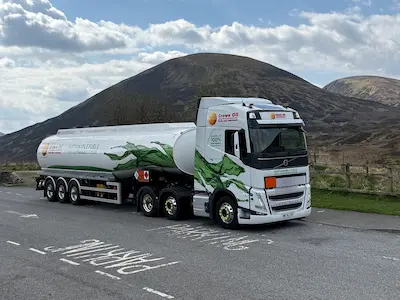What is HVO fuel? Learn more about the FAME-free renewable diesel in our FAQs
Our experts have answered our most commonly asked questions to help you better understand the features and benefits of HVO fuel – after all, we’re one of the largest UK suppliers.
As a leading UK fuel supplier, we often get asked questions by our customers about the many benefits of HVO fuel. If your questions are still unanswered at the end of this FAQ, simply give us a call on 0330 123 1444 and one of our fuel specialists will be able to help.

What is HVO fuel?
HVO stands for Hydrotreated Vegetable Oil, and it’s one of the cleanest fuels on the market. You may also hear it being referred to as HVO diesel or HVO renewable diesel.
It’s a second-generation, synthetic, advanced renewable diesel that eliminates up to 90% of net CO2 and significantly reduces nitrogen oxide (NOx), particulate matter (PM) and carbon monoxide (CO) emissions.
As a paraffinic, renewable fuel, HVO can be used as a drop-in alternative to red and white diesel as it meets EN 15940 standards and Fuel Quality Directive 2009/30/EC Annex II.
How is HVO produced?
HVO is produced through a chemical 2-stage process called hydrotreatment, where feedstocks are saturated with hydrogen at high temperatures (over 300°C), followed by a stage of isomerisation/cracking to give the end product the desired fuel qualities.
The highly controlled HVO fuel production process ensures a consistent and top-quality product. HVO does not contain any esters or contamination, which avoids its performance being affected either at the point of use or after extended storage.
This ensures it doesn’t react with water or oxygen or form sludge whilst in storage. HVO fuel is also resistant to attack by “diesel bug“, allowing it to be stored for extended periods of time.
Growth and reuse cycle
HVO is produced from waste streams, plant and animal matter. Plants are grown, and oils are taken away and used for their main purpose, recollected and then converted into HVO. When HVO is burnt, any CO2 that is released is then sequestered back into a plant on the next regrowth cycle. This closed loop ensures there is no net CO2 increase.
Is HVO the same as biodiesel?
No, HVO is different to biodiesel (FAME – Fatty Acid Methyl Ester) as it’s FAME-free. Biodiesel is made using a transesterification process, whereas HVO is made through hydrotreatment, which produces a more stable and cleaner-burning fuel.
Hydrotreating vegetable oils is a modern way to produce high-quality diesel fuels from completely renewable materials, which can be regrown when stock is needed. The crops that are used to produce HVO fuel bypass damage to the environment, the natural ecosystem and the drive for global deforestation.
First-generation biodiesel, also known as FAME or UCOMe (used cooking oil methyl ester) is produced by esterifying a natural oil or fat (vegetable oil or animal fat) with methanol to produce biodiesel and glycerol. Once the glycerol is removed from the biodiesel, it’s then added to all road transport diesel to meet the UK Government’s Road Fuel Transport Obligation (RTFO).
The ester bond present in biodiesel is weak and can be attacked by water, oxygen and diesel bug, which produces sludge when stored. The properties of biodiesel are a function of the raw materials used and therefore vary across producers and batches.
To reduce the environmental impact of fossil fuels, the amount of first-generation biodiesel which is added to fuels is being increased year-on-year by governments. This is leading to increased issues with fuel storage and operational performance, such as cold temperature flow and filter plugging. If used as a 100% fuel, first-generation biodiesel may also be more damaging to the environment as it can increase particulate and NOx emissions.
HVO fuel fully meets the RTFO and can therefore be used as a 100% fuel with no addition of first-generation biodiesel, removing all the operational problems that can happen when using this type of fuel.
What is HVO fuel used for?
Applications:
- Transportation – Buses, trucks, and personal vehicles.
- Industry – Construction machinery and agricultural equipment.
- Power Generation – Backup generators and off-grid power systems.
- Marine and Aviation (Future Potential) – Promising as a sustainable fuel for ships and planes.
HVO fuel is being adopted by a wide range of industries as a direct alternative to diesel, including construction, rail, events, marine and public transport due to its wide-ranging environmental and operational benefits.
It’s commonly used in:
- Portable generators
- Commercial boilers
- Agricultural tractors and machinery
- Industrial trucks and tankers
- Boats and vessels operating within inland waterways
- Construction equipment and machinery
What are the specifications of HVO fuel?
View our HVO fuel specs sheet or view our BS EN 15940 fuel specifications page, which includes the parameters, test method, units, specification and typical value.
What are the benefits of HVO fuel?
There are many benefits of using HVO fuel, which include:
Sustainability
- Up to 90% reduction in net CO2 emissions
- Emits fewer particles and NOx, improving air quality
- ISCC and RFAS approved
- Zero FAME, sulphur and fossil content
- Fully biodegradable, sustainable and non-toxic
Compatibility
- Adheres to EN 15940:2016 specifications
- Direct replacement for red and white diesel
- Approved by a huge number of OEMs
Improved performance
Extended lifespan of up to 10 years
- More stable than biodiesel (FAME)
- Reduced need for regular testing
- Resistant to oxidation and microbial growth
Year-round performance with no need for seasonal grade changes
- Excellent cold-weather performance with a CFFP point of -27°C
Free from aromatics, sulphur and metals
What is the price of HVO fuel per litre?
In terms of price per litre, HVO is generally more expensive than fossil diesel due to the production costs and raw material sourcing. However, it offers a significant reduction in net greenhouse gas emissions without needing to modify or replace existing infrastructure. This makes it a much more cost-effective alternative to electrification.
Thanks to our vast buying power, we can supply the renewable diesel to businesses across the UK at a competitive rate, within 48 hours of purchase.
If you would like to request an HVO fuel quote, call our HVO experts today on 0330 123 1444.
Is HVO fuel toxic?
HVO fuel is non-toxic and safer to handle compared to traditional fossil fuels like diesel. The advanced renewable diesel is produced by hydrotreating vegetable oils or animal fats, which results in a cleaner burning, sulphur-free and biodegradable fuel.
How long can you store HVO fuel for?
Thanks to the way HVO is produced, it can be left in storage for up to 10 years, as long as you ensure good tank maintenance and storage conditions. It’s still important to get checks on your tank and fuel, but the chance of degradation is much lower than with mineral diesel, which can only be stored for up to 1 year.
Can my vehicle run on pure HVO fuel?
Yes, the similarities between diesel and HVO mean that it can be used as a drop-in alternative in most cases, but it’s always best to check with your engine manufacturer first. Or you can call us on 0330 123 1444 and we’ll be able to help.
What manufacturer approvals does HVO fuel have?
HVO fuel has OEM approvals from a wide range of manufacturers for a wide range of diesel engines. An OEM approval means that the fuel can be used with no risk of voiding the warranty of the vehicle or machinery.
Please consult the list below of manufacturers that have approved the use of HVO fuel in their engines to see if your hardware is covered. If your engine manufacturer is not included, give us a call, and we will be able to contact the provider to determine whether your engine can use HVO.
Many vehicle handbooks are now outdated, so they may not include HVO approvals yet, but it’s likely you can use HVO without any issues.
Passenger car manufacturers that approve the use of HVO fuel
- Citroën
- DS Automobiles
- Ford (for its Transit van)
- Mercedes-Benz
- Peugeot
- Renault
- Volvo
Heavy-duty road vehicle manufacturers that approve the use of HVO fuel
- Mercedes-Benz
- DAF
- Iveco
- MAN
- Renault
- Scania
- Volvo Trucks
Non-road vehicle manufacturers that approve the use of HVO fuel
- AGCO
- Caterpillar
- John Deere
- Scania
- Steyr
Diesel engine manufacturers that approve the use of HVO fuel
- Daimler
- Deutz
- FPT
- ISUZU
- Volvo Penta
- MTU
- Perkins
- Scania
Can fossil-free HVO fuel cause engine problems?
HVO fuel can be used in most diesel engines, but you should always check with the engine manufacturer’s recommendations for each use. As mentioned already, HVO fuel has been approved by a wide range of OEMs as it performs excellently compared to regular diesel.
Can HVO fuel be used as an alternative to kerosene heating oil?
Currently, the UK heating authority, OFTEC, is running trials of HVO fuel as a viable alternative to kerosene heating oil with success. To do this, it is working with a range of partners, including Crown Oil, as part of its future fuels campaign.
The benefits of switching to HVO fuel from kerosene heating oil, beyond using a renewable fuel, are the significantly lower cost of converting a boiler to run on HVO, compared to overhauling the entire heating system. Retro-fitting your boiler to run on HVO will cost a few hundred pounds, while switching to a new system will cost thousands!
Switching to a renewable heating oil is important due to the government’s efforts to decarbonise heat from off-grid homes and commercial buildings to help achieve their net-zero targets. Alternative ways, including different fuels and oils, have been explored to reduce and eventually replace kerosene, heating oil and gas oil usage in homes and businesses.
The good news about using HVO fuel is that you will not need to replace your current kerosene-fuelled heating oil system in order to heat your home. Something that is a possibility in future with other options that are being explored.
HVO fuel can provide a workable solution without the expense for all housing types and incomes to help reduce the financial burden which other low-carbon options currently face. In fact, due to the similarities, many existing heating oil systems can use HVO as a drop-in alternative to existing heating oils.
Even where this is not possible (check with the manufacturer of your boiler first), many leading burner manufacturers have begun to develop low-cost retrofits for their boilers, to enable them to burn HVO fuel in place of kerosene and other heating oils. This makes it a much more desirable scheme to incentivise, reducing the high costs needed from the consumer and therefore increasing uptake far sooner.
Learn more about the renewable heating oil market with Crown HVO fuel.
What is paraffinic diesel?
Paraffinic diesels are defined as high-quality, synthetic, clean liquid fuels. HVO fuel is part of the paraffinic family of fuels, which are characterised by having low aromatic and naphthenic hydrocarbon content and zero sulphur, which makes them extremely pure fuels.
HVO is synthesised from vegetable oils or animal fats using a specialist hydrotreatment process. Its purity results in a significant reduction in harmful emissions when used in diesel vehicles and machinery through much-improved burning efficiency.
What’s the difference between FAME diesel and HVO fuel?
With a paraffinic petrochemical structure, HVO is functionally almost identical to fossil diesel and can therefore be used and handled as a drop-in alternative without needing to amend infrastructure or clean out existing stock. However, while like regular diesel in terms of energy content, density, viscosity and flash point, HVO fuel has several advantages over fossil fuels.
The chemical process used to manufacture HVO ensures a consistent product that contains no esters or contamination, factors which can adversely affect the performance of the fuel both at the point of use or after extended storage.
As the legislative requirement for “bio” content in fuel increases, the FAME content in fossil fuels will also increase. HVO fuel meets the requirements of current legislation – it’s 100% bio and FAME-free, so it doesn’t face the issues of stability faced by many existing biodiesel and gas oil products.
This makes HVO a much more stable product than mineral diesel with a reduced risk of degradation when in storage due to zero FAME and sulphur content. The production process affords a shelf life of up to ten years, providing good storage and maintenance, as opposed to the comparatively short 1-year shelf life of mineral diesel.
With a high cetane number of greater than 70 and low cloud point, HVO provides improved cold start performance, clean combustion and less chance of waxing in extreme temperatures than regular DERV.
Can you mix HVO fuel and diesel?
Yes, HVO fuel is fully miscible with mineral diesel, so you can simply top up your existing diesel stocks and go! However, many of the benefits will be lost if they are mixed due to diesel’s properties. When possible, it’s best to start fresh with a clean tank of HVO to guarantee its long storage life and high-quality attributes.
How does HVO reduce harmful emissions?
To demonstrate the reduction of emissions from using HVO fuel, we enlisted a fully independent test centre to compare the chemical output of both fuels in a 275 KVA generator. The results showed a significant NOx reduction of 7.5% across both tests, showing that using HVO fuel improves air quality by simply changing the fuel in non-designated areas.
The CO, CO2 and hydrocarbons (HC) results highlighted the improved burning characteristic of HVO fuel compared to the standard fuel. In particular, the large reduction in HC demonstrated that more of the HVO injected into the cylinder is combusted, reflecting the consistent nature of the fuel in terms of hydrocarbon molecules that it contains.
The table below compares the different characteristics of HVO fuel, FAME, and regular diesel.
| Characteristic | Diesel | FAME | HVO Fuel |
| BIO Content | 0 | 100 | 100 |
| Oxygen Level | 0 | 11 | 0 |
| Sulphur Content | <10 | <1 | <5 |
| Specific Gravity | 0,84 | 0,88 | 0,78 |
| Distillation Level, C | 200 – 350 | 340 – 355 | 200 – 320 |
| Cetane Level | 51 | 50 – 65 | 70 – 90 |
| Stability from Oxidation | Average | Below Average – Poor | Excellent |
What are the advantages of second-generation renewable fuels?
Advanced second-generation fuels, also known as advanced renewable fuels, have been designed to combat the operational and performance inadequacies of conventional fuels and earlier-generation biofuels:
- Maintain or enhance the net CO2 emission profile of conventional biofuels
- Ensure end-use quality compared to current sulphur-free fossil fuels
- Compatible with existing fuelling infrastructure
- Backwards and forwards compatibility with vehicle and plant technology
- Refuse to react with water and won’t be “eaten” by bugs
- Meet bio content requirements with no FAME content
- Remain mobile and filterable down to low temperatures
- Provide the best environmental credentials available from a liquid fuel
- Meet or exceed the lubricity requirements of the major diesel performance specifications EN 590 and ASTM D975
- Maintain compatibility with fossil diesel and the supply chain
- Improve the emission profile from E590 optimised engines and provide a platform for further development of C.N. engines
HVO fuel offers the best overall coverage between environmental, operational and performance parameters. It provides the best platform to build a legislative-compliant NRMM and MCP fleet.
What is the cetane number of diesel compared to HVO?
Mineral diesel has a cetane number of 51, and FAME biodiesel has a cetane number between 50 and 65 – whereas HVO has a cetane number between 70 and 90, which provides better starting performance, clean combustion and less chance of waxing in extremely cold weather.
What feedstocks are used to produce HVO?
HVO fuel can be made from several feedstocks, which include:
- Animal fats (rendered fat from the meat industry)
- Vegetable oils (soybean oil and rapeseed oil)
- Waste oils (used cooking oils)
Does HVO fuel contain any palm?
At Crown Oil, we do not support the use or sale of palm oil-derived HVO and will only supply ISCC-verified waste-derived product into the market.
The Proof of Sustainability (POS) confirms the origin of raw material and ensures that users can verify the credentials of Crown HVO. Our renewable diesel product does not contain any products that contribute to global deforestation and is therefore accepted by the RFTO. It also qualifies for further RFTO credits as it’s derived from 100% waste products.
Is HVO considered a carbon neutral fuel?
Whilst HVO can significantly reduce the net CO2 emissions compared to fossil diesel, it’s not entirely carbon neutral. Its carbon footprint depends on the feedstock used and the production process.
HVO fuel or electric vehicles? Which is better for the environment?
Achieving net zero on time means we need to be smarter about our technology choices; we can’t simply substitute them for something that appears to work in the short term.
The Institution of Mechanical Engineers recently published its Accelerating Road Transport Decarbonisation report, which raises some concerns over the Government’s electrification strategy.
While the decarbonisation of electricity is developing and electric vehicles (EVs) offer a reduction in emissions at the point of use, there are some hindrances.
Life cycle analysis, also referred to as ‘cradle-to-grave analysis’, is a technique used to calculate the environmental and human health impacts of a product over its lifespan. The government’s aim is to reduce emissions at the point of use; however, the lifecycle analysis revealed that the entire lifespan of a vehicle produces greenhouse gases, from production to eventual disposal.
In addition, the infrastructure needed to build charging points and lay cables to power EVs is not taken into account and will undoubtedly be fuelled by fossil fuels.
Lastly, there are around 308.3 million passenger vehicles on the road across Europe, with an average lifespan of 12 years, and 99% of these are diesel/petrol.
Given the urgency of the climate crisis, there isn’t enough time to wait for an increase in EV uptake to make a significant reduction in emissions to reset the balance of the carbon cycle. The adoption of electric vehicles is not the sole answer, and switching to renewable, paraffinic fuels offers a much easier and immediate solution.
What are the challenges associated with HVO?
Production costs – HVO production is energy-intensive and requires significant infrastructure and technology investment
Feedstock availability – this can fluctuate based on agricultural practices and market demand
Land use and sustainability – there are concerns related to the land use for producing crops like palm oil, as this can contribute to deforestation if not sourced responsibly. Crown Oil is a member of the RFAS and is certified by the ISCC, with our product verified at import to provide full traceability of all feedstocks used.
Who can buy HVO fuel?
Unlike rebated fuels such as red diesel, HVO fuel is available for purchase by anybody with the facilities to store it, whether that be in barrels/drums or their on-site fuel storage containers.
If you wish to purchase HVO fuel, it’s available in tanker deliveries of 500 litres to 36,000+ litres if you have the onsite infrastructure to store liquid fuels, or we can also deliver it in 205-litre barrels.
What quantities can I buy HVO in?
We supply HVO across the UK in a wide range of quantities depending on your needs:
- Drum/barrel deliveries (205 litres), IBCs or temporary fuel stations – For those who need the ease of handling or transportation
- Bulk deliveries (1,000 litres to 36,000+ litres) – For large fleets, industrial equipment and much more
How long will HVO fuel take to be delivered?
Thanks to our vast network of oil depots, we store HVO fuel onsite, which enables us to deliver it within our usual standard delivery times. This makes us one of the only UK suppliers that can have it delivered directly to your site within 24-48 hours of purchase.
If you need HVO fuel sooner, you can take advantage of our emergency fuel delivery service, which will ensure your HVO fuel delivery is with you in just a few hours.
If you have any questions about our HVO fuel, call our experts today on 0330 123 1444. We’ll be happy to discuss your requirements and answer any additional questions about HVO fuel, along with our other fuels and services.







